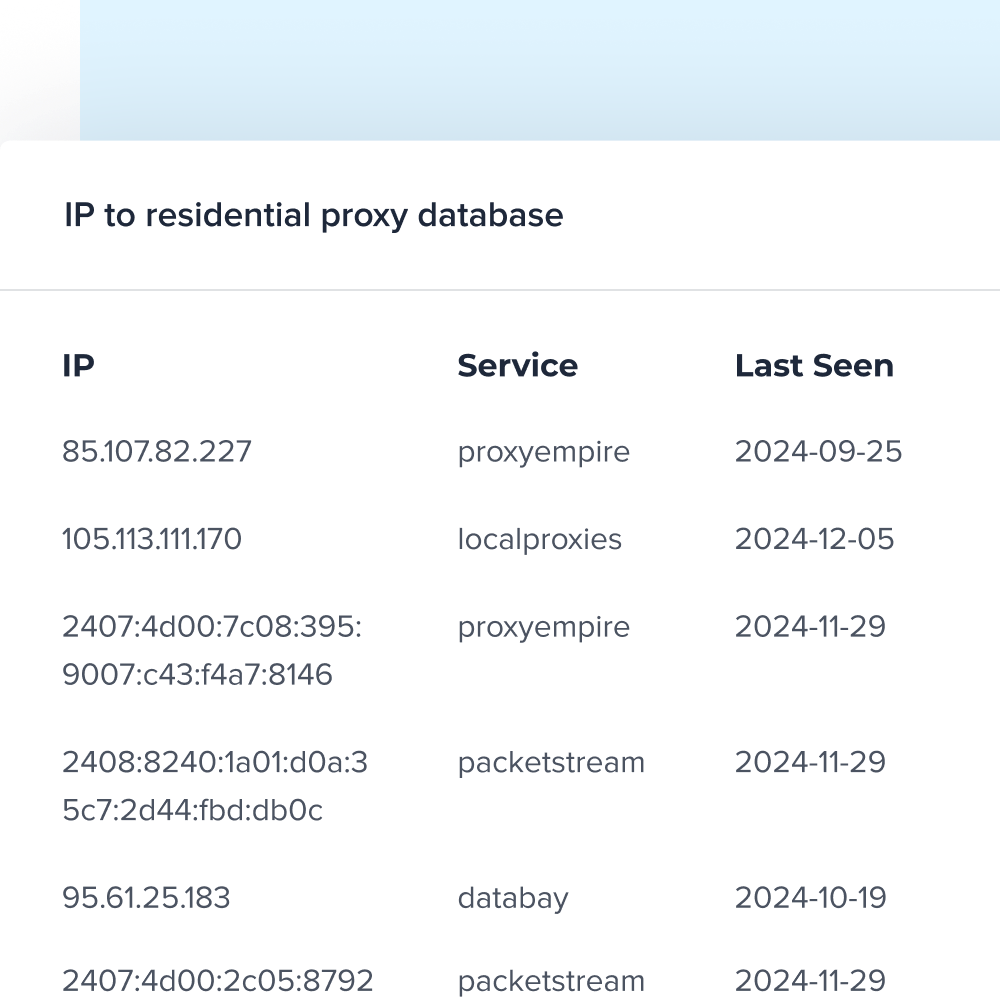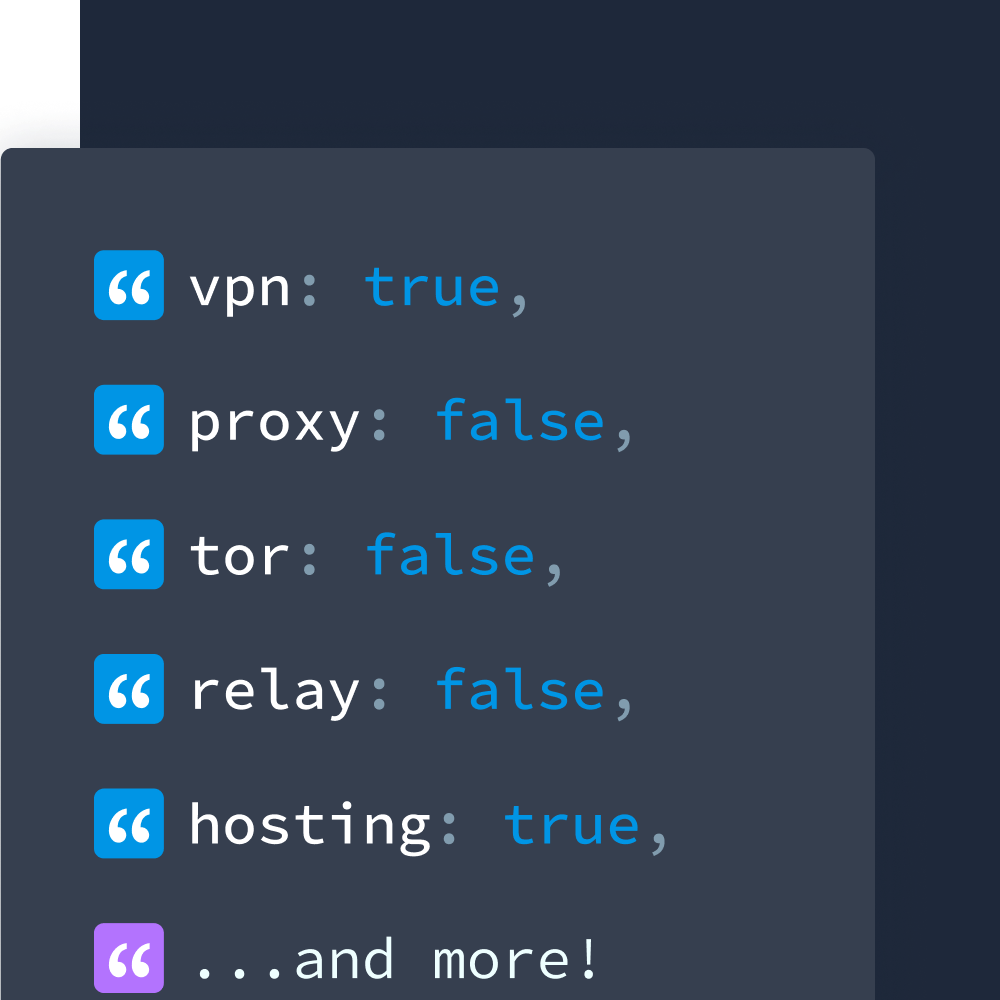 My IP ↗or
My IP ↗orCalculating the ROI of Privacy IP Data: A Practical Guide

In today's digital landscape, protecting against VPNs, proxies, and other anonymizing services has become essential for businesses. But how do you justify the investment in privacy detection data? This guide will walk you through calculating the return on investment (ROI) for IPinfo's Privacy IP data across different use cases, with practical examples and implementation guidance.
The Global Cost of Fraud
When calculating ROI for privacy detection and fraud prevention, benchmarking against global averages helps contextualize your results.
According to the Association of Certified Fraud Examiners (ACFE), businesses globally lose approximately 5% of their annual revenue to fraud each year. Specifically in the ecommerce sector, a study by Cybersource reported that merchants globally lose around 2.9% of revenue annually due to payment fraud.
These statistics underscore the potential scale of financial losses and highlight the importance of proactive investment in fraud detection solutions like IPinfo’s Privacy Detection data.
Understanding the Value Components
The ROI calculation begins with identifying key value drivers that privacy detection IP data can impact. Let's explore each component and how IPinfo's data specifically addresses these challenges.
Fraud Prevention
Fraudsters frequently use VPNs and proxies to mask their true location and identity when conducting malicious activities. Typically, when fraud occurs, the issuing bank reimburses the legitimate cardholder, leaving the retailer responsible for both the lost value of shipped goods and additional chargeback fees.
When a transaction originates from a known VPN or proxy service, businesses can implement additional verification steps or block the transaction entirely. Key metrics to track include:
- Reduced chargebacks from fraudulent transactions
- Fewer stolen account takeovers
- Decreased fake account creation
- Lower manual review costs
Privacy detection data can identify VPN services, proxy servers, and other anonymizing technologies. This enables organizations to proactively detect suspicious transactions, allowing them to implement additional verification steps or challenge transactions flagged as risky. This approach significantly reduces chargeback costs, protects revenue, and avoids blocking genuine transactions.
Detect Residential Proxies with Accurate IP Data
Add a critical layer of defense to your fraud prevention and security workflows.
Security Enhancement
Modern security teams face the challenge of distinguishing legitimate traffic from potential threats. IPinfo's privacy detection database includes comprehensive coverage of hosting providers, VPN services, and proxy networks, updated daily to reflect the latest changes in the threat landscape enabling our customers to achieve:
- Faster threat detection and response through automated privacy service identification
- Reduced incident investigation time with enriched IP intelligence
- Enhanced protection against automated attacks using hosting detection
- Decreased risk of data breaches through better traffic filtering
Digital Rights Management
Content providers and streaming services face significant challenges in maintaining geographic licensing restrictions and preventing unauthorized access. IPinfo's privacy detection data helps identify and block VPN and proxy users attempting to bypass geographic restrictions.
- Accurate geolocation to determine user location
- Privacy detection to identify VPN/proxy usage
- ASN data to understand the network context
Detailed ROI Calculation Framework
Let's break down the ROI calculation into detailed components with specific formulas and examples.
Step 1: Baseline Cost Calculation
To properly assess ROI, first calculate your current fraud-related costs without privacy detection data. Retailers typically face three distinct costs when fraudulent transactions occur:
- Direct fraud losses: Lost revenue from goods or services provided but not legitimately paid for. Calculated by multiplying your monthly transactions by your fraud rate and average transaction value.
- Chargeback fees: Fees charged by banks or payment processors per fraudulent transaction.
- Operational costs: Manual review and fraud investigation labor costs.
The first step is understanding your current costs without privacy detection. This formula combines direct fraud losses, chargeback fees, and operational costs:
Example calculation:
Step 2: Impact Analysis
Once we understand the baseline costs, we can calculate the impact of implementing IPinfo's privacy detection data. This involves two main components:
Fraud Prevention Impact
This formula calculates how much you'll save by preventing fraudulent transactions:
The expected reduction percentage varies by industry, but typically ranges from 10-40% based on IPinfo customer data. Here's how it works:
Operational Efficiency Impact
This formula calculates savings from reduced manual review time:
The formula accounts for:
- Current time spent on manual review
- Expected efficiency improvement
- Cost of staff time
- Annualized savings
Step 3: Total ROI Calculation
The final ROI calculation combines all savings and compares them to the investment cost:
This formula shows your return as a percentage of your investment. A positive ROI indicates that the benefits outweigh the costs. Here's how it works:
This means that for every dollar invested in IPinfo's privacy detection data, you receive $3.63 in return through combined fraud prevention and operational efficiency savings. To learn more about anonymous IPs and privacy detection, download our ebook.
Privacy detection made easy
Prevent fraud and save money with our accurate, reliable privacy detection API. Setup takes minutes.
Industry-Specific Implementation Strategies
Each industry faces unique challenges that IPinfo's privacy detection data can address. Let's explore detailed implementation strategies and ROI calculations for key sectors.
Ecommerce Implementation
Ecommerce platforms face sophisticated fraud attempts and account abuse that can significantly impact their bottom line. IPinfo's privacy detection data helps strengthen existing fraud prevention measures throughout the customer journey. Additionally, ecommerce businesses can identify VPN users who might attempt to access country-specific promotions or regional pricing intended for different markets, ensuring pricing strategies and special offers reach their intended audience.
Account Creation and Management
Ecommerce fraud often begins with bulk account creation using VPNs and proxies. By integrating IPinfo's privacy detection data into their signup flows, ecommerce platforms can identify suspicious signups originating from known VPN and proxy IPs. The privacy data also helps platforms identify traffic from hosting providers commonly used for automated account creation, while enabling more accurate validation of user location claims through carrier, and geolocation data.
Transaction Security
Modern ecommerce requires real-time fraud prevention without adding friction for legitimate customers. By incorporating IPinfo's privacy detection data into their transaction screening process, platforms can instantly identify VPN and proxy usage during checkout. Combined with carrier detection data for mobile purchase validation and geographic data for restriction enforcement, ecommerce businesses can build comprehensive transaction security while maintaining a smooth customer experience.
Post-Purchase Analysis
Historical analysis forms a crucial component of fraud prevention. IPinfo's comprehensive IP data enables ecommerce platforms to enhance their pattern detection across transaction history, helping identify emerging threat vectors and refine risk scoring based on real-world outcomes. This data-driven approach helps platforms stay ahead of evolving fraud tactics.
Financial Services Implementation
Financial institutions face unique challenges in balancing security, compliance, and user experience. IPinfo's comprehensive IP data helps strengthen these critical areas through enhanced intelligence about network traffic.
Authentication and Access Control
In the financial sector, sophisticated account takeover attempts pose a significant threat. Financial institutions can use IPinfo's privacy detection data to identify anonymized access attempts and enhance their authentication systems. By incorporating IP intelligence into their security stack, banks can better correlate traffic patterns with user behavior to spot suspicious activities early.
Transaction Risk Analysis
Financial transactions require sophisticated real-time risk analysis. By integrating IPinfo's privacy detection data with their risk scoring systems, financial institutions can enhance their transaction monitoring with VPN/proxy detection, historical IP patterns, and accurate location data. This additional intelligence enables more informed decisions about transaction approval while supporting regulatory compliance requirements.
Regulatory Compliance
Financial services must meet strict regulatory requirements for transaction monitoring and reporting. IPinfo's data helps institutions enhance their compliance documentation with detailed IP characteristics for all transactions, improve geographic restriction enforcement, and maintain more comprehensive audit trails for suspicious activity investigation. This detailed IP intelligence helps demonstrate robust compliance controls to regulators.
Digital Media and Streaming Services
Content providers must protect valuable digital rights while ensuring a seamless viewing experience. IPinfo's privacy detection data serves as a valuable component for strengthening streaming infrastructure.
Content Access Control
Geographic content restrictions require sophisticated controls to maintain licensing compliance. IPinfo's privacy detection data enables streaming services to enhance their access control systems by identifying VPN and proxy usage. When combined with carrier data and location intelligence, content platforms can make more accurate decisions about geographic access rights.
Content Delivery and Analytics
Beyond access control, IPinfo's data helps platforms optimize their content delivery and improve analytics accuracy. With reliable IP intelligence, streaming services can better distinguish between real user locations and VPN endpoints, enabling more efficient CDN routing and content caching decisions. This same data enhances advertising targeting and user behavior analysis by providing accurate geographic context.
Gametech and Gambling
Gaming platforms require robust tools to prevent cheating and ensure regulatory compliance. IPinfo's privacy data helps strengthen these critical controls.
Fair Play and Compliance
Gametech faces exploitation through VPNs and proxies, particularly for location-based advantages or bonus abuse. By incorporating IPinfo's privacy detection data into their security systems, gaming platforms can better identify suspicious patterns while maintaining a positive experience for legitimate players. The IP intelligence also enhances compliance controls and geofencing for restricted jurisdictions.
Regulatory compliance is particularly critical for online gambling companies, as many jurisdictions mandate that operators must prevent VPN users from accessing their platforms. Non-compliance can result in substantial fines and, more critically, the potential loss of gambling licenses. However, these companies must balance compliance with the risk of incorrectly blocking legitimate users, which directly impacts revenue. For example, a major gaming operator in Brazil leverages the confidence fields in IPinfo's Privacy Detection Extended dataset to implement a more nuanced approach – only blocking IP addresses with the highest confidence ratings as VPNs, thereby minimizing false positives while meeting regulatory requirements.
Fraud Prevention and User Experience
Gaming fraud often involves sophisticated tools and techniques. IPinfo's privacy detection data helps platforms enhance their fraud detection capabilities by providing intelligence about bot traffic from hosting providers, enabling better identification of coordinated fraud attempts across multiple IPs, and strengthening prevention of location spoofing for bonus abuse. This enhanced protection allows gaming platforms to focus on providing engaging experiences for legitimate players while maintaining strong security controls.
Maximizing ROI Through Proper Implementation
To achieve optimal returns from your IPinfo IP data privacy detection investment, consider these expanded implementation steps:
1. Technical Integration Planning
Before implementation, conduct a thorough technical assessment:
- Evaluate API integration points in your existing infrastructure
- Determine optimal data refresh rates for your use case
- Plan for redundancy and failover scenarios
- Consider batch processing vs real-time lookup requirements
2. Data Integration Strategy
Develop a comprehensive data integration approach:
- Map IPinfo fields to your existing data schema
- Create normalized scoring models for risk assessment
- Establish data retention and archival policies
- Plan for data volume growth and scaling
3. Performance Optimization
Implement best practices for optimal performance:
- Cache frequently accessed data locally
- Implement intelligent retry mechanisms
- Use bulk lookup APIs where appropriate
- Monitor and optimize API usage patterns
4. Measurement and Monitoring
Establish robust monitoring systems:
- Track key performance indicators (KPIs)
- Monitor API response times and availability
- Set up alerting for anomalous patterns
- Regular reporting on ROI metrics
Get Started With Privacy Detection Data
Calculating and achieving ROI from IPinfo's data requires a thoughtful approach to both implementation and measurement. While the initial calculations provide a framework for justifying the investment, the real value comes from proper integration and ongoing optimization of the data's usage in your specific context.
By focusing on your organization's unique use cases and leveraging IPinfo's comprehensive dataset, you can build both a compelling business case and an effective implementation strategy. The key is to start with clear objectives, implement systematically, and continuously measure and optimize your usage of the data.
Remember that these calculations and implementation strategies should be customized to your organization's specific context and needs. IPinfo's team can help you develop more detailed ROI projections and implementation plans based on your unique situation and industry benchmarks.
Want to learn more about how IPinfo's Privacy Detection data can benefit your organization? Contact our team for a personalized ROI analysis and implementation consultation.
About the author

As the product marketing manager, Fernanda helps customers better understand how IPinfo products can serve their needs.

